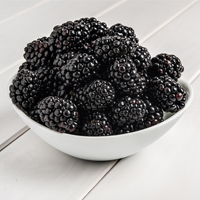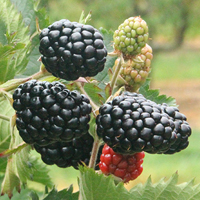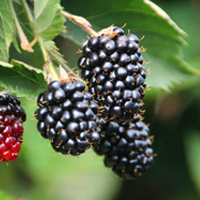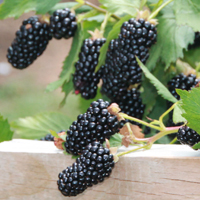University of Arkansas
Blackberry Breeding Program
Innovation and improvement distinguish the University of Arkansas (UA) blackberry variety development program. Directed by Dr. Margaret Worthington, the program develops and evaluates both floricane and primocane cultivars – emphasizing sweet blackberries. The selection of new floricane blackberry varieties centers on improving productivity, berry size and flavor. Floricane varieties fruit on second year canes that have overwintered. These cultivars perform best in temperate climate conditions. Severe winter temperatures may damage unprotected canes. Flowering is limited to a single period of active growth upon breaking dormancy. This flower set concentrates the floricane crop in a short harvest window from early to mid-summer.
In 2004, Dr. John Clark – the previous Director of the Fruit Breeding Program at the University of Arkansas, introduced the first primocane blackberry varieties. Unique to the U of A blackberry variety program, primocane blackberry varieties produce flower and fruit on canes that grow in the same year. No overwintering is required. Depending on temperatures in the spring and summer, in temperate latitude regions primocane cultivars produce fruit in the late summer and early fall. Used in combination with floricane varieties, primocanes can substantially prolong the period in which the grower can place blackberry fruit in the market.
The development of the primocane varieties promises to fundamentally change the cultural practices and to extend the economically viable range of commercial blackberry production. In northern areas, the grower avoids damage to over-wintering canes by mowing the plants to the ground at the end of the growing season. In low latitude or equatorial regions, producers take advantage of the minimal chilling requirement that characterizes primocane cultivars. The accumulation of chilling degrees is not needed to initiate flower set as is the case with floricane types. Consequently, the primocane cultivars adapt to low latitude, high elevation growing areas. For the first time, blackberry producers have the genetic resources similar to those used by raspberry growers over the past 50 years.
In 2013, EMCO CAL entered into a variety development agreement with the U of A. Under this agreement, EMCO CAL undertakes extensive trials and evaluation of advanced selections and new genetic material. EMCO CAL will focus its evaluation activities in major small fruit production regions outside of the United States, Mexico and Japan.


